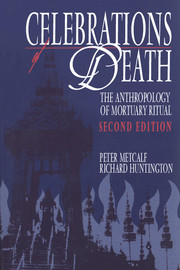INTRODUCTION TO THE SECOND EDITION
Published online by Cambridge University Press: 05 February 2015
Summary
In the twelve years since this book was first published in 1979, the trend toward public discussion of deathways has continued. Inevitably, it has stimulated an interest in the comparative study of death rites, in which anthropology has the principal part to play. Our study was the first in a long time directly to pursue this project, following an epoch in which religion had been relegated to a merely supporting role in anthropological theory. It remains the only general and integrated (though not, of course, comprehensive) treatment that we know of, and it has evidently been found useful by scholars and teachers in several disciplines, including theology, history, and archaeology. For that very reason, perhaps, we have come in for our share of criticism from fellow social anthropologists, some of it generous, some snide, in the manner of academe. Interestingly, the criticism has revolved around just those issues that we used to provide the three-part structure of the book, indicating their continuing theoretical importance. In general terms, these issues are: the relation between ritual and emotion, the political significance of ritual, and the universal in symbolism. We feel that some recent approaches have been misleading, even retrograde. We take the opportunity of this new edition to review these developments, and to respond to critics.
- Type
- Chapter
- Information
- Celebrations of DeathThe Anthropology of Mortuary Ritual, pp. 1 - 23Publisher: Cambridge University PressPrint publication year: 1991



